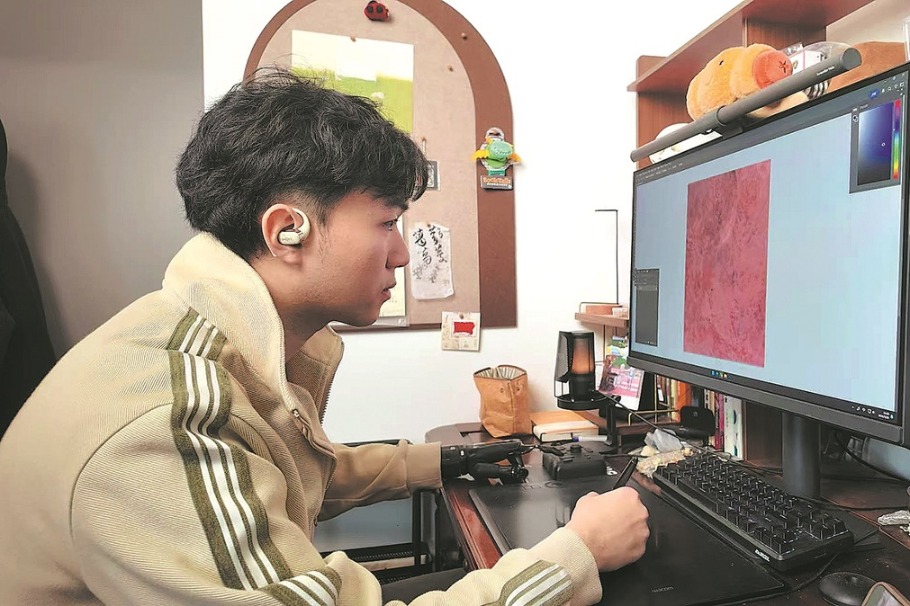Capturing animals on film is a 'tail' of the unexpected
Documentary forum looks at critical relationship between humans and nature, Chen Bowen reports in Haikou.

"We only have one Earth," said Wang Wei, chief director of Documentary Factory (Hainan) Media Corp, as he was hosting the 4th Hainan Island International Film Festival Documentary Forum on Dec 18. "We never ceased in our efforts to record the natural world, nor have we stopped in our pursuit of an answer to a harmonious coexistence between humans and nature. This is the mission of documentaries."
The forum, on the theme of "dedicated documentary — harmonious coexistence between man and nature", invited directors and filmmakers to discuss the roles and development of documentaries.
"President Xi Jinping stressed 'harmony between humanity and nature' as a major feature of China's modernization at the 20th National Congress of the Communist Party of China," said Xia Fei, chairman of Hainan Federation of Literary and Art Circles, in the opening speech for the forum.
"He said that respecting, adapting to and protecting nature is essential for building China into a modern socialist country in all respects. If art is a window to the soul and a way to communicate with the world, then documentaries are a telescope through which man and nature look at each other."
Time and patience
It is meaningless to talk about animals without the nearly ubiquitous human beings, said Zeng Hairuo, director of documentaries Roof of the World and The Land of Spirits, at the forum.
In Zeng's eyes, to find the animals' comfort zone and understand their reactions is one of the most important things in filming nature documentaries.
Zeng and his team usually spend a lot of time to get close to the animals they intend to shoot, and learn about the details of their daily life. Before each project, they consult animal experts, meet local guides including shepherds and hunters, as they have a greater understanding of animal habits and can find the places where animals show their hidden traits.
Unlike commercial films, the production of nature documentaries requires time and patience. Waiting is a must, and the camera crew need to keep this in mind — only two to three shots over one day would be used, according to Zeng.
When his team shot the yaks for The Land of Spirits, the camera crew stayed with the animals in Qinghai province for many days, and gradually could approach them. "The yaks have an understanding of you, and their sensory system adapts to your presence. You seem to be a harmless subject to them, so they will be less resistant and then you have a chance to get good shots and tell good stories," Zeng said.
In another case, wild Siberian tigers, also a species featured in The Land of Spirits, have far more sensory abilities than humans, according to Zeng, and it is impossible to expect them to be unaware of human presence. So the crew spent a lot of time accompanying the tigers, showing their respect to the animals, and let them get used to the presence of the camera crew.
Now with 4K and 8K high-resolution video cameras, and advanced means of shooting animals, such as infrared, remote, camouflage, underwater and aerial shooting, the documentary industry has witnessed technological advances. "But the longest lens can't solve all the problems," he said. "At the end of the day, you need to get closer to animals and let them accept your existence."
Building a bridge
While Zeng and his team try to show a friendly and respectful attitude toward animals, Sun Shuyun, director of documentaries Himalaya: Ladder to Paradise and China: Nature's Ancient Kingdom, another guest speaker at the forum, wants to incorporate the Chinese philosophy of the unity of man and nature, especially the 24 solar terms, into documentaries.
"For thousands of years, Chinese people have revered and cared for nature. To act in accordance with the rhythm of nature has been our belief and way of living," she said. "Our ancestors paid much attention to the behavior of animals and plants in each solar term. With such a thorough understanding of nature, we can apply the solar terms and natural phenomenon in our daily life."
Some animals have their unique behavior and own mysteries concerning the 24 Chinese solar terms. For example, the winter solstice is the time when tigers and antelopes start mating and when Yangtze elks shed their antlers to maintain their vitality. How our understanding of these mysteries showcases the relationship between man and nature can be a good angle for nature documentaries, Sun added.
Apart from presenting the ancient oriental wisdom between man and nature, "we can reveal that in face of global warming, the timing of our solar terms have actually been advanced by at least one solar term. This is a universal problem and a common theme of documentaries", she said.
Pioneering communication
Director and producer Yang Chao, also a guest speaker, said he considers documentaries his source of spiritual treasures, where he can be close to nature and life. He notices that documentaries are at the forefront of the development of video art. "We have seen a large number of documentaries, especially those in international film festival competitions, that often use a lot of film techniques like storytelling, conceptual art, and installation art," he said.
For documentaries, documenting images and using plots are like a bird's two wings, said Zhang Tongdao, head of the documentary center of Beijing Normal University. He said he believes that documentaries are born to cross time, space and culture. "By presenting unique cultural aesthetics and true experiences, documentaries can become a tool for international dialogues and exchanges," Zhang said.
Situ Zhaodun, known as "the father of Chinese documentaries", said online at the forum that he found documentaries could help society to progress. With mobile phones in our hands, Situ said he encourages people to record and create documentaries to change our life and promote the progress of our times.
































